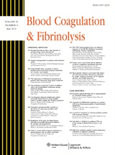
BLOOD COAGULATION & FIBRINOLYSIS
Scope & Guideline
Illuminating the Pathways of Coagulation and Fibrinolysis
Introduction
Aims and Scopes
- Coagulation Disorders and Thrombosis:
The journal covers various aspects of coagulation disorders, including inherited and acquired thrombophilias, immune thrombocytopenic purpura, and other thrombotic conditions, focusing on their pathophysiology, diagnosis, and management. - Clinical Outcomes and Treatment Strategies:
Research published in the journal often explores clinical outcomes associated with different treatment modalities, including novel therapies for hemophilia, anticoagulation strategies, and the effectiveness of new drugs. - Laboratory Diagnostics and Methodologies:
A significant part of the journal is dedicated to advancements in laboratory diagnostics, including the evaluation of coagulation assays, thromboelastometry, and the development of new diagnostic techniques for bleeding disorders. - Genetic and Molecular Studies:
The journal also emphasizes genetic studies related to coagulation factors and their mutations, providing insights into the molecular basis of bleeding disorders and potential therapeutic targets. - Epidemiological Studies:
Epidemiological research focusing on the prevalence, risk factors, and socio-economic impact of coagulation disorders is a key area of interest, contributing to the understanding of these conditions at a population level.
Trending and Emerging
- Impact of COVID-19 on Coagulation:
Research investigating the effects of COVID-19 on coagulation and thrombotic risk has surged, reflecting the pandemic's significant impact on health and its implications for patients with pre-existing coagulation disorders. - Innovative Therapies and Treatments:
There is an increasing number of studies focusing on innovative therapies for treating thrombotic and bleeding disorders, including targeted therapies and novel agents like caplacizumab and emicizumab. - Real-World Evidence and Outcomes Research:
The journal is increasingly publishing studies that provide real-world evidence regarding treatment outcomes, emphasizing the importance of clinical effectiveness data in everyday practice. - Integration of Genetic Testing in Management:
Emerging themes include the integration of genetic testing into the management of coagulation disorders, highlighting the growing importance of personalized medicine in this field. - Interdisciplinary Approaches to Hemostasis:
There is a trend towards interdisciplinary research that incorporates insights from immunology, oncology, and infectious diseases, reflecting the complex interactions between coagulation and other bodily systems.
Declining or Waning
- Traditional Anticoagulation Therapies:
There has been a noticeable decrease in studies solely focused on traditional anticoagulation therapies such as warfarin, as newer direct oral anticoagulants gain prominence and become the focus of research. - Case Reports of Rare Disorders:
The frequency of case reports detailing rare coagulation disorders seems to be waning, possibly due to a shift towards more comprehensive studies that aggregate data across multiple cases rather than focusing on singular instances. - Basic Science Studies:
Basic science studies that explore fundamental mechanisms of coagulation without direct clinical applications are appearing less frequently, as the journal pivots towards research with immediate clinical relevance. - Historical Perspectives on Coagulation Disorders:
There is a decline in publications that address historical perspectives or traditional views on coagulation disorders, indicating a shift towards contemporary and evidence-based practices.
Similar Journals

JOURNAL OF THROMBOSIS AND THROMBOLYSIS
Elevating discourse in cardiovascular medicine.JOURNAL OF THROMBOSIS AND THROMBOLYSIS, published by Springer in the Netherlands, serves as a vital platform for research in the fields of Cardiology and Cardiovascular Medicine and Hematology. With an impressive impact factor, this journal ranks in the Q2 category for both fields according to the latest metrics, evidencing its significant influence and contribution to ongoing scholarly discourse. Spanning over three decades from 1994 to 2024, the journal provides an essential source for innovative studies, clinical practices, and comprehensive reviews related to thrombosis and thrombolysis. Researchers, clinicians, and students alike will find valuable insights and cutting-edge knowledge that address the complexities of blood coagulation and its implications in cardiovascular health. The journal is indexed in Scopus, with commendable rankings, further establishing its reputation in the academic community.

Hematology Reports
Empowering researchers to transform hematology.Hematology Reports is an esteemed academic journal in the field of hematology, dedicated to advancing the understanding of blood disorders and their treatment. Published by MDPI, a leading Swiss publisher known for its commitment to open access since 2009, this journal provides a valuable platform for researchers and healthcare professionals to disseminate innovative findings and foster collaboration within the academic community. The journal features an array of articles ranging from clinical studies to laboratory research, and is indexed in Scopus, where it currently holds a rank of 113 out of 137 in the Medicine - Hematology category, placing it in the 17th percentile. As an open-access journal, Hematology Reports ensures that critical research is accessible to a global audience, supporting the dissemination of knowledge that has the potential to improve patient outcomes. This journal is an essential resource for those engaged in the study and treatment of hematological conditions, encouraging dialogue and the exchange of ideas to enhance clinical practices.
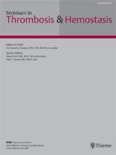
SEMINARS IN THROMBOSIS AND HEMOSTASIS
Exploring breakthroughs in cardiovascular and hematologic health.SEMINARS IN THROMBOSIS AND HEMOSTASIS is a prestigious academic journal dedicated to advancing the understanding and practice of thrombosis and hemostasis, published by THIEME MEDICAL PUBL INC. With an ISSN of 0094-6176 and an E-ISSN of 1098-9064, this journal plays a critical role in disseminating groundbreaking research and reviews in the fields of cardiology and hematology. As of 2023, it holds a commendable Q2 ranking in both the Cardiology and Cardiovascular Medicine and Hematology categories, with Scopus ranks of #55 out of 387 and #23 out of 137, respectively, positioning it within the top percentiles of these disciplines. The journal publishes articles that bring forth innovative findings and facilitate clinical applications, making it an essential resource for researchers, healthcare professionals, and students focused on improving patient care and outcomes. Since its inception in 1974, SEMINARS IN THROMBOSIS AND HEMOSTASIS continues to evolve with the changing landscape of medical research, striving to fill the gaps in knowledge and foster an informed approach to hemostatic disorders.
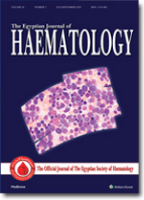
Egyptian Journal of Haematology
Navigating the Future of Hematology with Rigorous ResearchThe Egyptian Journal of Haematology, published by WOLTERS KLUWER MEDKNOW PUBLICATIONS, stands as a pivotal resource in the field of hematology, particularly within the context of Egypt and the broader Middle Eastern region. This journal is dedicated to disseminating high-quality research that explores the latest advancements in blood disorders, hematologic malignancies, and transfusion medicine. With a focus on original research, case studies, and reviews, it aims to provide a comprehensive platform for hematologists, researchers, and healthcare professionals to enhance their understanding and management of hematological conditions. Although it is not an open-access journal, the rigorous peer-review process ensures that only the most impactful studies are published, contributing to the journal's reputation in the academic community. The Egyptian Journal of Haematology serves as an essential tool for advancing knowledge, improving clinical outcomes, and fostering collaboration among experts in the field.
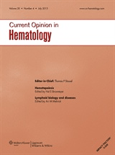
CURRENT OPINION IN HEMATOLOGY
Empowering clinicians and researchers with cutting-edge insights.CURRENT OPINION IN HEMATOLOGY is a leading peer-reviewed journal published by Lippincott Williams & Wilkins, focusing on the latest advancements and insights in the field of hematology. With an impressive impact factor and ranked in the first quartile (Q1) of its category, this journal serves as a vital resource for researchers, clinicians, and students seeking to stay informed on contemporary issues and emerging trends in hematological research and treatment. Established in 1994, it showcases critical reviews, expert commentary, and systematic analyses across a broad spectrum of hematology topics, contributing significantly to clinical and experimental knowledge through its robust editorial standards. While offering traditional subscription access, CURRENT OPINION IN HEMATOLOGY remains committed to providing a platform that bridges the gap between fundamental research and clinical application, making it indispensable for professionals dedicated to advancing patient care and scientific understanding in hematology.
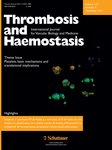
THROMBOSIS AND HAEMOSTASIS
Leading the Way in Hematology InnovationTHROMBOSIS AND HAEMOSTASIS is a prestigious journal published by GEORG THIEME VERLAG KG, dedicated to advanced research in the field of hematology. With an esteemed Impact Factor and recognized as Q1 in its category for 2023, the journal is regarded for its pivotal role in disseminating significant findings that contribute to our understanding of thrombosis and hemostasis. Since its inception in 1976, this journal has continuously published cutting-edge studies and reviews, making it a vital resource for researchers, healthcare professionals, and students alike. The journal’s commitment to high-quality research is reflected in its impressive Scopus Ranking of #18 out of 137 in Medicine - Hematology, placing it in the 87th percentile among its peers. Although not currently open access, THROMBOSIS AND HAEMOSTASIS remains an authoritative source for exploring novel therapeutic strategies and the latest scientific advancements in the field. Based in Stuttgart, Germany, this journal serves as a critical platform for sharing knowledge and fostering collaboration within the global hematology community.
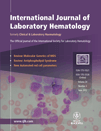
International Journal of Laboratory Hematology
Pioneering insights in hematology for a healthier tomorrow.The International Journal of Laboratory Hematology, published by WILEY, serves as a vital resource in the field of hematology, delivering high-quality research findings and innovations within laboratory practices since its inception in 2007. This journal, accessible under Open Access options, showcases cutting-edge studies that span critical aspects of biochemistry and clinical laboratory methodologies. With a notable impact factor reflected in its Q2 and Q3 rankings across various categories—such as Biochemistry (medical) and Hematology—this journal stands out within the Scopus rankings, positioning itself within the 60th and 59th percentiles of its respective fields. Situated in the United Kingdom, the journal's objectives lie in disseminating pivotal research that enhances our understanding of hematological disorders and laboratory techniques, making it an essential tool for researchers, professionals, and students alike who are committed to advancing the science of laboratory hematology and its applications.
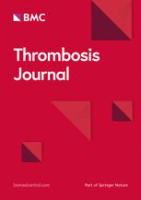
Thrombosis Journal
Bridging gaps in knowledge on thrombotic diseases.Thrombosis Journal is a pioneering open-access publication offering critical insights into the field of hematology, contributing significantly to the understanding of thrombotic diseases. Published by BMC since its inception in 2003, this journal stands out with its commitment to accessibility and dissemination of research, ensuring that valuable findings are readily available to the global scientific community. With an impressive Q2 ranking in the Hematology category as of 2023, the journal boasts a notable presence in the Scopus rankings, positioned at Rank #73/137 in its field. Researchers, healthcare professionals, and students can benefit from a rich array of articles that encompass clinical studies, reviews, and innovative methodologies, all aimed at advancing knowledge and fostering collaboration in the field. The journal is headquartered in the United Kingdom, and its open-access model has enabled a diversity of perspectives and research innovations to flourish, solidifying Thrombosis Journal as an essential resource for those dedicated to combating thrombotic disorders.
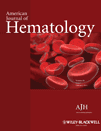
AMERICAN JOURNAL OF HEMATOLOGY
Transforming Research into Clinical BreakthroughsAmerican Journal of Hematology, published by Wiley, stands as a premier outlet for the dissemination of cutting-edge research in the field of hematology. With a commendable impact factor and ranked #9 out of 137 in the Scopus medicine category, this journal has established a robust presence since its inception in 1976. Operating in the Q1 quartile for hematology, it serves as a crucial resource for researchers, clinicians, and students dedicated to understanding blood disorders and advancing treatment methodologies. While the journal does not currently offer open access options, it remains highly regarded for its rigorous peer-review process and impactful contributions to the scientific community. With coverage extending into 2024, the American Journal of Hematology is committed to fostering innovation and collaboration within the hematological sciences.
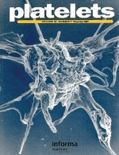
PLATELETS
Unveiling the complexities of thrombosis and hemostasis.PLATELETS is a distinguished journal published by Taylor & Francis Inc that has been at the forefront of research in the fields of hematology and medicine since its inception in 1990. With an ISSN of 0953-7104 and an E-ISSN of 1369-1635, this journal boasts a solid reputation, as reflected by its Q2 ranking in both Hematology and Miscellaneous Medicine categories in 2023. PLATELETS serves as an essential platform for disseminating pioneering research, reviews, and case studies related to platelet biology, thrombosis, hemostasis, and their clinical implications. Although not an open-access publication, it is indexed in reputable databases, ensuring visibility and citation of quality contributions. Researchers, clinicians, and students alike will find valuable insights that may inform their work and enhance their understanding of the crucial role of platelets in health and disease. This journal's commitment to advancing knowledge and fostering innovation makes it a pivotal resource in the academic community.